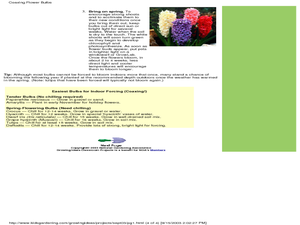Science 4 Inquiry
Plant Structures Lab Stations
In China, hibiscus is known as the shoe flower because it is used to polish shoes, while in Hawaii, it is honored as the state flower. Young scientists learn about the structure and function of flowers. They dissect hibiscus...
Rain Bird Corporation
Rain Forest Teaching Curriculum
Take young naturalists on an exploration of the world's tropical rainforests with this extensive collection of lessons and activities. Whether its creating leaf and flower prints or investigating the absorption spectrum of...
Core Knowledge Foundation
Plants Tell It Again!™ Read-Aloud Anthology
A 190-page anthology explores the life and parts of plants, flowers, and trees while boosting reading comprehension skills. Literature and informational texts showcase Johnny Appleseed and George Washington Carver. Lessons...
Berkshire Museum
The Three Life-Giving Sisters: Plant Cultivation and Mohican Innovation
Children gain first-hand experience with Native American agriculture while investigating the life cycle of plants with this engaging experiment. Focusing on what the natives called the Three Sisters - corn, beans, and squash - young...
Cornell University
Weed IPM
Go on a weed hunt! Scholars gain insight into the characteristics of plants and examine the outdoor environment in order to identify five different types of weeds. Learners then show what they know with a one-page reflection.
Chicago Botanic Garden
Preparing for Project BudBurst
Male deer growing antlers to begin the breeding season is an example of a phenological event. First in a four-part series is an activity requiring individuals to collect phenological data on their campus. Classes discuss phenology, the...
Education Outside
Life Cycle of a Sunflower
From a tiny seed needing water and warmth to the bud that will blossom into a flower, elementary pupils illustrate the stages of the sunflower life cycle through dance and drawing.
Curated OER
Coaxing Flower Bulbs
Students complete an experiment for coaxing flower bulbs into growth. In this flower growth lesson, students research various types of flower bulbs that may be used to complete a coaxing experiment. Students then complete a flower...
Core Knowledge Foundation
A Time for All Seasons - Spring
Celebrate the arrival of spring with this fun primary grade science unit. Engaging young scientists with a variety of hands-on activities and inquiry-based investigations, these lessons are a great way to teach children about...
Curated OER
Plant Parts We Eat
I bet the kids in your class will love to eat their vegetables after an engaging lesson about edible plants. They read information about vegetables and edible plants, sort vocabulary words, identify plant parts, measure and graph the...
Terminix
The Pollinator
What do bees and children have in common? They both love their sweets. Decorate a flower pot or bucket to look like a brightly colored flower and fill it with wrapped candy and cheese puffs. Have learners reach into grab the candy,...
Curated OER
What Is It?
Play the game of Tag and differentiate between plants and animals. Explore the characteristics of plants. Identify the major parts of plants (e.g., seeds, stem, pistil) and describe their basic functions. Compare the requirements of some...
Curated OER
Plant Dissection
Students study plant parts and their functions in a dissection activity. In this plant dissection instructional activity, students use several handouts to help them learn parts of the plant and their functions. Students then dissect...
Teach Engineering
Design Inspired by Nature
Let nature guide your engineering designs. By taking apart a flower, pupils learn about reverse engineering. They use the results to brainstorm designs for new products or ideas. This is the seventh installment of a nine-part Life...
Desert Discovery
Saguaro Parts
Young biologists identify the basic structures of a saguaro cactus. They study the functions of each of the structures, and label them on a picture of a saguaro cactus embedded in the plan. This simple, and easy-to-implement...
Curated OER
Bigger Flowers
Students discuss flowers and their parts, examine works by Georgia O'Keeffe, and draw, color, or paint large flowers.
Horticultural Society of New York
Dress Up Your Salad
Salad dressings use a variety of different ingredients, but it's important to have a healthy balance of greens to create a delicious mix. Young chefs examine five types of herbs including chives, basil, dill, parsley, and thyme to...
Chicago Botanic Garden
Plant Phenology Data Analysis
Beginning in 1851, Thoreau recorded the dates of the first spring blooms in Concord, and this data is helping scientists analyze climate change! The culminating instructional activity in the series of four has pupils graph and analyze...
Berkshire Museum
Adopt a Schoolyard Tree
Help young scientists connect with nature and learn about trees with a fun life science lesson. Heading out into the school yard, children choose a tree to adopt, taking measurements, writing descriptions, and drawing sketches of it in...
Curated OER
Fish and Flowers
Learners read and discuss a research article that explains the unlikely link between increased fish populations and increased plant pollination. They answer reading guide questions to discover this ecological relationship.
Forest Foundation
Forest Health
Young foresters examine the strategies, like prescribed burns and thinning, that are employed to ensure healthy forests.
Curated OER
What Bees Eat
Students study plant and animal interdependence by studying bees and pollination. In this interdependence lesson, students discuss flower parts and dissect it to show its reproductive parts. Students then use tissue and pipe cleaners to...
Chicago Botanic Garden
Plant Phenology Data Analysis
Scientists monitor seasonal changes in plants to better understand their responses to climate change, in turn allowing them to make predictions regarding the future. The last activity in the series of six has scholars analyze BudBurst...























